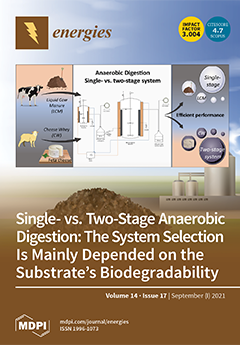This paper presents the impact of thermal lag on the progress of different coal types’ gasification by CO
2. The analysis was performed using thermogravimetry and numerical modeling. Experiments were carried out at a heating rate of 1–50 Kmin
−1 and a
[...] Read more.
This paper presents the impact of thermal lag on the progress of different coal types’ gasification by CO
2. The analysis was performed using thermogravimetry and numerical modeling. Experiments were carried out at a heating rate of 1–50 Kmin
−1 and a temperature ranging from 383 to 1173 K. The developed numerical model enabled the determination of a true sample temperature considering the gasification process to consist of two single-step consecutive reactions. Analysis revealed that the average thermal lag in CO
2 is about 11% greater than that in N
2, which is related to the properties of CO
2 itself and the occurrence of the char–CO
2 reaction. The onset temperature of the reverse Boudouard reaction depends on the type of fuel; however, no simple relationship with the coal rank was found. Thermal lag has an impact on the kinetic parameter A
α0.5 describing devolatilization, up to 19.8%, while in the case of the char–CO
2 reaction, this influence is expected to be even greater. The performed analysis proved that disregarding thermal lag may significantly hinder the interpretation of the analyzed processes; thus, TG experiments should be carried out with a low heating rate, or at the post-processing stage, a thermal lag model needs to be employed.
Full article





